
by: Rebecca J. Brimmer, International President and CEO
In 1982, I was in my bedroom reading my Bible and praying about whether or not to join a trip to Israel. As I thumbed through my Bible, it fell open to Isaiah 62. The words leaped off the page. I felt like my soul was branded with these words,
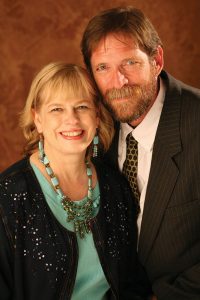 “For Zion’s sake I will not keep silent, and for Jerusalem’s sake I will not keep quiet, until her righteousness goes forth like brightness, and her salvation like a torch that is burning…On your walls, O Jerusalem, I have appointed watchmen; all day and all night they will never keep silent. You who remind the LORD, take no rest for yourselves; and give Him no rest until He establishes and makes Jerusalem a praise in the earth” (Isaiah 62:1, 6–7
“For Zion’s sake I will not keep silent, and for Jerusalem’s sake I will not keep quiet, until her righteousness goes forth like brightness, and her salvation like a torch that is burning…On your walls, O Jerusalem, I have appointed watchmen; all day and all night they will never keep silent. You who remind the LORD, take no rest for yourselves; and give Him no rest until He establishes and makes Jerusalem a praise in the earth” (Isaiah 62:1, 6–7
NASB).
Since that day, I have known that God wants His people to stand with Israel, pray for Israel, and speak up for Israel, and He is calling us to do so until Jerusalem becomes “a praise in the earth.” Anyone who reads the news knows that this has not happened yet. Israel has not yet become a praise in the earth! This passage is a strong call to pray for Jerusalem—the center of Judaism; the center of Israel; the seat of the government of Israel; and the place which is holy to Jews, Muslims and Christians. It is the place where Yeshua (Jesus) was crucified, rose again and ascended to the Father.
So, why pray for Israel? The first and foremost reason is because God has made it our responsibility. Those of us who love the God of Israel need to recognize that He has a deep connection to this land: “A land for which the LORD your God cares; the eyes of the LORD your God are always on it, from the beginning of the year to the very end of the year” (Deut. 11:12). But, praying for Israel is not only important for Israel; it brings God’s blessings to the intercessor. “Pray for the peace of Jerusalem: ‘May they prosper who love you’” (Ps. 122:6).
My husband and I have now lived in Israel for almost 28 years. During that time we have often cried out in prayer for the nation and people of Israel. We have also learned a lot about prayer from the Jewish people.
In a simple phrase, prayer is communication with God. However, the subject is so deep that entire books have been written on the subject and have not begun to plumb the depths of understanding prayer. The Bible is replete with examples of prayer and admonishments to pray along with instructions on how to pray.
“Be anxious for nothing, but in everything by prayer and supplication, with thanksgiving, let your requests be made known to God; and the peace which surpasses all understanding, will guard your hearts and minds through Christ Jesus” (Phil. 4:6–7). In this passage we see that we are to pray about everything! And we are to believe that prayer is powerful. Andrew Murray once said, “We must begin to believe that God, in the mystery of prayer, has entrusted us with a force that can move the Heavenly world, and can bring its power down to earth.”
Rabbi Abraham Joshua Heschel wrote, “Prayer is our attachment to the utmost. Without God in sight, we are like the scattered rungs of a broken ladder…In prayer we shift the center of living from self-consciousness to self-surrender. God is the center toward which all forces tend. He is the source, and we are the flowing of His force, the ebb and flow of His tides. Prayer takes the mind out of the narrowness of self-interest and enables us to see the world in the mirror of the holy.”
Oswald Chambers said, “Prayer does not fit us for the greater work; prayer is the greater work.”
The Apostle Paul instructed the Thessalonians to “pray without ceasing” (1 Thess. 5:17).

Photo: Pressmaster/shutterstock.com
In Luke 18:1 we read, “Then He [Yeshua] spoke a parable to them, that men ought always to pray and not lose heart.”
The Psalms contain this well-known Scripture, “Enter into His gates with thanksgiving, and into His courts with praise. Be thankful to Him and bless His name” (Ps. 100:4).
This is a beautiful pattern for prayer. I always exalt the Lord, thank Him, praise Him and bless His name before bringing personal requests to Him, or even before intercession for others.
Prayer is a powerful communication tool that God has given us. It is an open channel to speak with the Lord. Prayer must be an essential part of every believer’s life.
Are we guilty of the sin of prayerlessness? If so, now is the time to repent and rededicate ourselves to prayer.
 It is important for us to discern the heart and voice of God for the tumultuous times we live in. We need to search the Word of God and pray the Scriptures. A number of years ago I wrote For Zion’s Sake I Will Not Be Silent, a prayer journal with specific Scriptures to pray concerning Israel. Praying in agreement with God’s Word is a powerful prayer tool. Now, more than ever, we need to commit ourselves to relationship with our God and seek His direction for our lives, our families, our churches, our nations and our world. It is time to grow up spiritually and realize that there is a spiritual battle raging around us. The lines have been drawn. God is calling us to stand with Him and join the fray against the forces of evil.
It is important for us to discern the heart and voice of God for the tumultuous times we live in. We need to search the Word of God and pray the Scriptures. A number of years ago I wrote For Zion’s Sake I Will Not Be Silent, a prayer journal with specific Scriptures to pray concerning Israel. Praying in agreement with God’s Word is a powerful prayer tool. Now, more than ever, we need to commit ourselves to relationship with our God and seek His direction for our lives, our families, our churches, our nations and our world. It is time to grow up spiritually and realize that there is a spiritual battle raging around us. The lines have been drawn. God is calling us to stand with Him and join the fray against the forces of evil.
In August 2006 Israel was suddenly thrust into war with Hezbollah in Lebanon. At the time my husband Tom and I were in Taiwan where I was teaching seminars. In Hsinchu City, I was scheduled to speak on “The Hebraic Roots of Christianity,” but I felt the Lord say, “This is not the time for business as usual.”
I spent the afternoon praying and felt the Lord telling me that He would use the praise, worship and prayers of the Taiwanese Christians to be like the worshipers who went before the army in Jehoshaphat’s time (2 Chron. 20). At that time Israel faced an overwhelming enemy force. In response, Jehoshaphat called the people together for united, corporate prayer. “For we have no power against this great multitude that is coming against us; nor do we know what to do, but our eyes are upon You” (2 Chron. 20:12b).

Photo: salajean/shutterstock.com
The LORD responded saying, “Do not be afraid nor dismayed because of this great multitude, for the battle is not yours but God’s” (2 Chron. 20:15b). That night we had a powerful time of prayer, praise and worship which I believe God used to go before the army of Israel. Later Tom said, “That may be the reason God wanted us to go to Taiwan.”
Often people will come up to me and tell me that they faithfully pray for the peace of Jerusalem. Of course, I will tell them that is wonderful. Sometimes I ask them how they do it. The oddest look comes over their faces. I know they are thinking, “I just told you.” In fact frequently they will repeat themselves, “I pray for the peace of Jerusalem.”
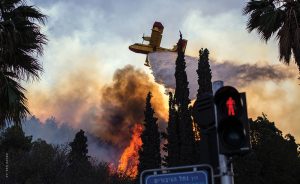
Fires in Haifa Photo: Avi Ben Zaken/wikipedia.org
I am thrilled that so many people have realized that praying for Jerusalem’s peace is important, but I do think that we need to have more than just a one-phrase prayer. How much better to pray specifically for real people in crisis, or the government leaders who need wisdom for specific situations; or for the prime minister as he faces problems on a multitude of fronts. As I write this, Israel has more than 200 fires burning. The city of Haifa had to evacuate 60,000 people and nearly 600 homes were destroyed. We have been closely following the news and as we do we pray for the specific needs we are reading about. In today’s world it is so easy to know what to pray for! All we have to do is open the newspaper or check the internet.
During the Second World War there was an intercessor by the name of Rees Howells. In 1937, God led him and his prayer group of up to 100 people to intercede for Britain daily from 7 p.m. till 12 midnight (after working a full day). They continued this throughout the war. They prayed about specific issues and saw God answer in specific ways.
My father and mother, Dr. David and Ramona Lewis, believed in praying specifically. My childhood was peppered with accounts of specific prayers followed by specific answers. One of the more memorable stories involved a preacher of a church where my dad was the evangelist. My father was a writer as well as a speaker and had a Royal turquoise blue manual typewriter (in a pebble gray case) that he used to write his sermons and articles. Every day my father would be hard at work, and the pastor would say, “Oh Brother Lewis, I know if I just had a typewriter like yours, I could do so much for the kingdom of God.”
Day after day, they had this conversation until one day my dad said, “Let’s get down on our knees and ask God for a typewriter for you.” So they got on their knees and my father prayed something like this, “Lord, you see how much my brother needs a typewriter for kingdom use, so Lord I ask you to bring him a Royal, turquoise blue, manual typewriter in a pebble gray case by two o’clock this afternoon.” End of prayer!
At 2:00 p.m. a knock came at the door. One of the elders of the church stood there. He said, “Pastor, I don’t know why, but I felt the Lord say that I should bring this to you,” and he handed him the exact model and color of typewriter that they had prayed for at exactly the right time! In later years this pastor never ceased to marvel about the way God answered a specific prayer.
My parents literally prayed about everything, and we saw God answer many prayers in very specific ways. Just consider, general prayers tend to get general answers while specific prayers tend to get specific answers.
When I read about a terror attack in Jerusalem, I stop and pray for those injured by name. I pray for the doctors, the paramedics and the nurses for skillful treatment. I pray for comfort for the families of those killed. When we hear of terror tunnels we pray for the communities in risk. For biblical examples of in-depth specific prayers, take a look at the psalms.

Photo: jorome/shutterstock.com
William B. Silverman wrote a book called Rabbinic Stories for Christian Ministers and Teachers. One chapter is devoted to “The Service of the Heart—Prayer.” He writes, “A learned Rabbi was once asked: ‘What do you do before you pray?’ He answered: ‘I pray that when I pray I may pray with all my heart.’” This is often referred to as praying with kavana (כוונה). Philip Birnbaum says, “Kavana has been defined as a technical term which includes attention, concentration, and spirit of devotion. ‘Better is a little with kavana than much without it.” Maimonides, one of Judaism’s great sages said, “Prayer without devotion is not prayer.”
Yeshua also lauded heartfelt prayer over self-aggrandizing prayer in the parable of the Pharisee and the tax collector (Luke 18:11–14). The tax collector poured out his heart to God saying, “God, be merciful to me a sinner!” (v. 13) and Yeshua said “I tell you, this man went down to his house justified rather than the other; for everyone who exalts himself will be humbled, and he who humbles himself will be exalted” (Luke 18:14).
John Bunyan once said, “In prayer it is better to have a heart without words than words without a heart.”
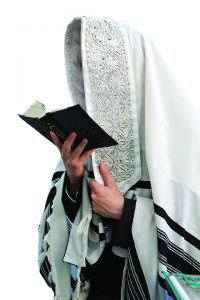
Photo: mikhail/shutterstock.com
In a Jewish worship service there are written liturgical prayers that all the congregants pray together. These prayers are beautiful examples of worship and acknowledgement of the sovereignty of God. Our friend, David Nekrutman, has said that if you want to understand Judaism, then you should read the Jewish prayer book. Certainly it would be possible to pray these prayers by rote, but the greater blessing is to pray them with kavana lev (intention of the heart). I have found the written prayers to be inspiring and full of worship to God.
While it is more common in evangelical circles to pray spontaneously, Christian tradition also includes beautiful liturgical prayers. Sometimes Christians will say something to me about the Jewish faith being stilted. They assume that because there is an emphasis on liturgical prayer that they don’t pray spontaneously. But that is simply untrue. I am amazed at the devotion to prayer that I see in many of my Jewish friends. Three times a day there are corporate prayer services (morning, afternoon and evening); many times throughout the day devout Jewish people acknowledge God with blessings for virtually every occurrence; and it is common to see Jewish people praying the psalms while sitting on the bus. Finally, in many conversations I’ve had with Jewish people they describe responding to life’s issues with spontaneous prayer.
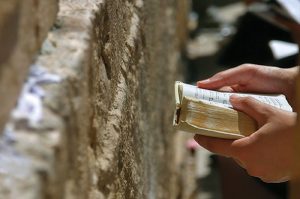
Photo: Rostislav Glinsky/shutterstock.com
The Amidah (a prayer said while standing) begins with the words, “Blessed are You, LORD our God and God of our fathers, God of Abraham, God of Isaac, and God of Jacob; the great, mighty and awesome God, God most high, who bestows acts of lovingkindness, who creates all, who remembers the lovingkindness of the fathers and will bring a Redeemer to their children’s children for the sake of His name in love. King, Helper, Savior, Shield; Blessed are You, LORD, Shield of Abraham.”
Dr. David Bivin, of Jerusalem Perspective, believes that Christians should become familiar with the Amidah prayer, which is so central to Judaism. “Since the prayer Jesus taught his disciples (The Lord’s Prayer) is apparently an abbreviated version of the Amidah (“Standing,” in Hebrew) or Eighteen Benedictions, I think it is important for Christians to be familiar with this central prayer of Jewish religious life. The prayer is very ancient, some of the changes to it being made 200 years before the time of Jesus. The prayer is also very beautiful, full of scriptural quotations and allusions. Every Jew was obligated to pray the Eighteen Benedictions daily; however, in times of emergency, one was permitted to pray a shortened form of the Eighteen, such as the Lord’s Prayer.” (To read more you will find the link in the bibliography.)
In Mark 11 there is a wonderful passage on prayer and faith. “Therefore I say to you, whatever things you ask when you pray, believe that you receive them, and you will have them. And whenever you stand praying, if you have anything against anyone, forgive him, that your Father in heaven may also forgive your trespasses” (Mark 11:24–25). I wonder if this reference to standing and praying is a reference to the Amidah prayer.
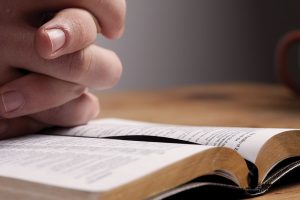
Photo: Prixel Creative/shutterstock.com
We often think of prayer as a solitary endeavor, and in fact there are references in Scripture to private prayer. In the introduction to the Lord’s Prayer we read, “But, you, when you pray, go into your room, and when you have shut your door, pray to your Father who is in the secret place; and Your Father who sees in secret will reward you openly” (Matt. 6:6).
How interesting, then, that Yeshua goes on to give an example of prayer (the Lord’s Prayer) to His disciples that is not in the singular tense, but rather in the plural tense. He uses words like: “Our Father… Give us… forgive us, deliver us.”
There are many examples of corporate prayer in the Scriptures. In Daniel’s great prayer of repentance, he also prays in the plural tense (see Daniel 9:4–19).
It seems clear to me that both personal and corporate prayer is necessary and scriptural. We need to gather together corporately to pray for our nations, our families, our churches. “If My people who are called by My name will humble themselves, and pray and seek My face, and turn from their wicked ways, then I will hear from heaven and will forgive their sin and heal their land” (2 Chron. 7:14).
Corporate prayer is very common in Judaism. Marvin Wilson says, “Most Jewish prayer employs the plural ‘we,’ not the singular ‘I.’ Prayer expresses the ‘cry of the whole community.’”
This is one of the reasons that Bridges for Peace holds Chai (Hebrew word for life) prayer meetings each month in locations around the world. God has given us the gift of prayer and has asked us to use it to pray for our communities, our nations and always the nation of Israel.
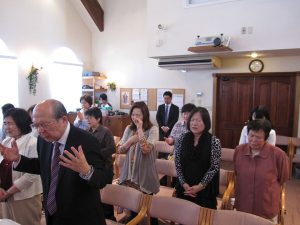
Photo: Bridges for Peace.com
Do you believe that prayer changes things? I do! There is power in prayer. In the book of Revelation chapter 8 we see a scene in heaven.
“Then another angel, having a golden censer, came and stood at the altar. He was given much incense, that he should offer it with the prayers of all the saints upon the golden altar which was before the throne. And the smoke of the incense, with the prayers of the saints, ascended before God from the angel’s hand. Then the angel took the censer, filled it with fire from the altar, and threw it to the earth. And there were noises, thunderings, lightnings and an earthquake” (Rev. 8:3–5).
Just imagine, your prayers are preserved in heaven along with the prayers of all the saints. They rise before God and there is power in those prayers.
We have an open invitation to communicate with the Most High in prayer. Why, then, are prayer meetings so poorly attended? If I were to get an invitation to meet with Israel’s prime minister, I guarantee you that I would do everything in my power to be at that meeting. How much greater is our invitation to meet with the King of Kings and Lord of Lords! We need to ask the Lord to ignite in us a desire to spend time in His presence.

Photo: wave break media/shutterstock.com
I know that prayer is not just a spiritual exercise. It is not just a method to get your needs met. It is a powerful tool that God has given us to effect change in our hearts and in our world. Prayer does indeed change hearts and circumstances. The Bible is full of incidents when people prayed and things changed. Elijah prayed, and it didn’t rain for three years. He prayed again, and it rained. He prayed for fire to come from heaven to consume the sacrifice in the challenge with the priests of Baal, and it did. Elisha prayed for the Shunammite widow’s son, and he was raised from the dead.
Let’s take this powerful tool of prayer, and allow the Holy Spirit to teach us how to use it for the sake of the Kingdom of God. And always remember to pray for the nation and people of Israel. “For thus says the LORD: ‘Sing with gladness for Jacob [this is not the Church—this is the Jewish people/nation], and shout among the chief of the nations; proclaim, give praise and say, “O LORD, save Your people”’” (Jer. 31:7). How important is this to God? Remember what He said to watchmen on the walls of Jerusalem in Isaiah 62? He said we should “give Him no rest until He establishes and makes Jerusalem a praise in the earth” (Isa. 62:7). This phrase, “Give Him no rest” indicates more than a quick “prayer for the peace of Jerusalem.” This is an injunction to pray fervently, with kavana lev, and constantly until God’s purposes for Israel and Jerusalem are fulfilled. Rise up Church! Now is the time to dedicate ourselves to praying for Israel.
Birnbaum, Philip. Encyclopedia of Jewish Concepts. New York: Hebrew Publishing Company, 1993.
Bivin, David. “The Amidah Prayer: A New Translation,” http://www.egrc.net/articles/other/amidah.html
Heschel, Abraham Joshua. Man’s Quest for God. Santa Fe, New Mexico: Aurora Press, 1998.
Sacks, Jonathan. The Koren Siddur. Jerusalem: Koren Publishers, 2010.
Silverman, William B. Rabbinic Stories for Christian Ministers and Teachers. New York: Abingdon Press, 1958.
Wilson, Marvin. Our Father Abraham. Grand Rapids, Michigan: Eerdmans, 1989.
All logos and trademarks in this site are property of their respective owner. All other materials are property of Bridges for Peace. Copyright © 2025.
Website Site Design by J-Town Internet Services Ltd. - Based in Jerusalem and Serving the World.